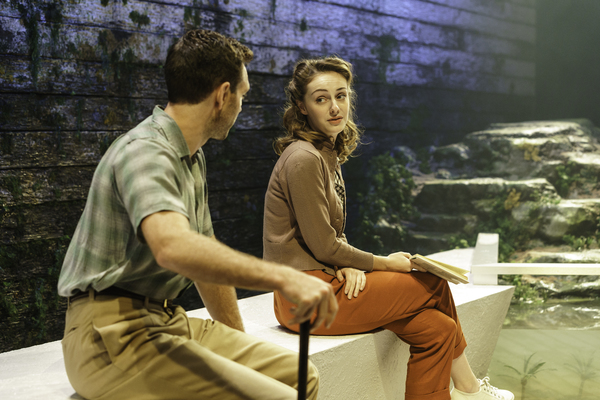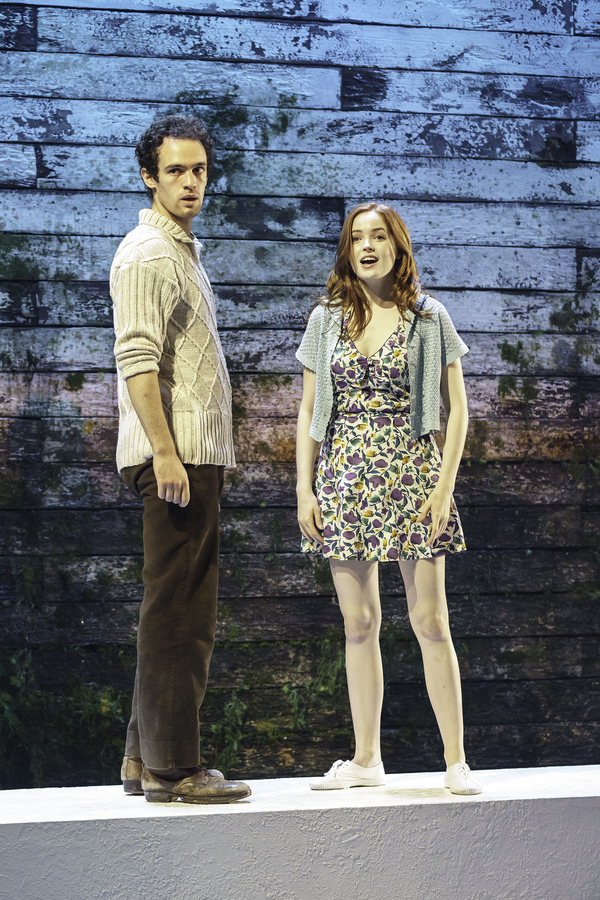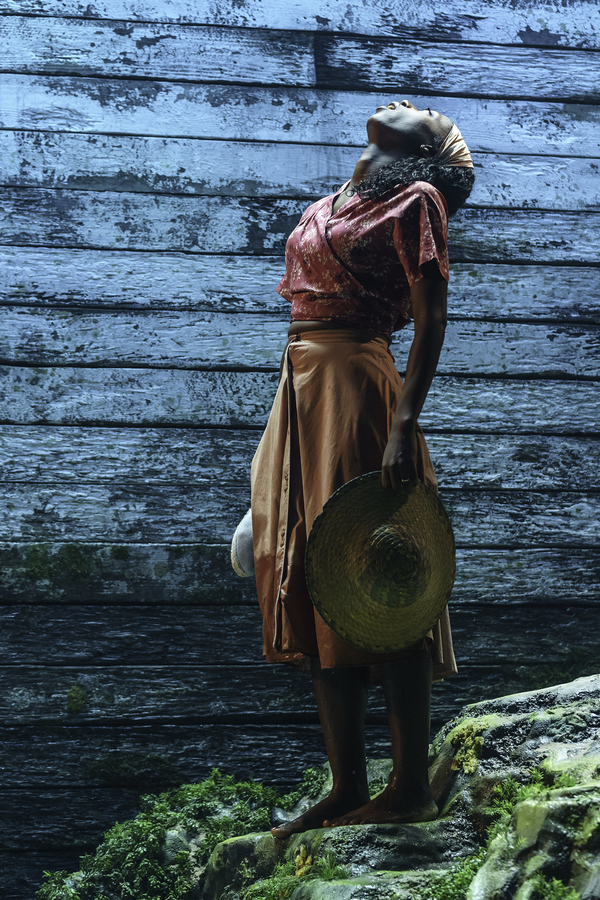What a profoundly beautiful play is Ibsen's The Lady from the Sea. It stands in relation to the earlier, relatively confined A Doll’s House, Ghosts and Rosmersholm as Shakespeare's late romances do to the more claustrophobic tragedies. And with what apparent ease, art concealing art, do director Kwame Kwei-Armah, the Young Vic’s next Artistic Director, and the diamantine new performing version by Elinor Cook transport us in the Donmar Warehouse from a Norwegian fjord in the 1880s to the Caribbean of the 1950s.
Nothing is lost of the play's essence, the race issue only brushed in with the lightest of touches to suggest the heroically enduring protagonist’s ties to her village and her role as the lighthouse keeper's daughter, a sudden reversion to the Caribbean accent tellingly placed when she’s under the spell of a not-so-past infatuation. In this setting the three would-be-independent women still have obstacles to overcome, and islanders are perhaps even more susceptible than fjord-folk to the myths and magic of the sea. It's not easy to buy into the melodrama of an uneasily married woman in thrall to the pledge, or curse, forced on her 16-year-old self by a murderous Flying Dutchman. Ibsen, and Cook, get round it through the reasoners of the play questioning its supernatural nature, as do we - and eventually the heroine, too; and they make it subservient to the question of what freedom is, for men as well as women, in relationships and marriage contracts. The symbol of rings that bind and can also be loosened is especially telling. Cook extends its significance magically in an ending that is more poetic than Ibsen’s.
It's not easy to buy into the melodrama of an uneasily married woman in thrall to the pledge, or curse, forced on her 16-year-old self by a murderous Flying Dutchman. Ibsen, and Cook, get round it through the reasoners of the play questioning its supernatural nature, as do we - and eventually the heroine, too; and they make it subservient to the question of what freedom is, for men as well as women, in relationships and marriage contracts. The symbol of rings that bind and can also be loosened is especially telling. Cook extends its significance magically in an ending that is more poetic than Ibsen’s.
Unusually for Ibsen, all the participants other than the Stranger are sympathetic, needing no special light shone on their characters for us to love them. Kwei-Armah's cast make us know who they are as people very quickly, and our attitudes tend to be of smiling complicity rather than the usual Ibsen-induced shock or alarm. Jim Findley's Renaissance man Ballestrad, painting a picture of a half-submerged mermaid which buys into the misogynist nature of such legends, eases us in; Helena Wilson (pictured above with Tom McKay's Arnholm) and Ellie Bamber (pictured below with Jonny Holden), real and recognisable, respectively make us like the capable elder daughter of the widowed and remarried Dr Wangel, Bolette, who’s her own worst enemy, and her stroppy adolescent sister (the name, Hilde Wangel, is of course to take on great significance for Ibsen when she re-emerges in The Master Builder).
 The outsider men are fine-tuned, too. You know immediately what you’re to make of the consumptive young Lyngstrand, a pretentious sculptor doomed to failure if he doesn’t die first, in the physically and vocally note-perfect performance of Jonny Holden; Tom McKay as Arnholm, the girls’ former teacher scarred by the war, is a model of wistful, pained sympathy. Jake Fairbrother as the Stranger seems nominally too young – the big theme is about four characters pushing 40, facing a disillusioned future if they can't relinquish the power of the past – but conveys the necessary power of malice as well as the energy that attracted Ellida to him in the first place.
The outsider men are fine-tuned, too. You know immediately what you’re to make of the consumptive young Lyngstrand, a pretentious sculptor doomed to failure if he doesn’t die first, in the physically and vocally note-perfect performance of Jonny Holden; Tom McKay as Arnholm, the girls’ former teacher scarred by the war, is a model of wistful, pained sympathy. Jake Fairbrother as the Stranger seems nominally too young – the big theme is about four characters pushing 40, facing a disillusioned future if they can't relinquish the power of the past – but conveys the necessary power of malice as well as the energy that attracted Ellida to him in the first place.
Nikki Amuka-Bird (pictured below) refuses to succumb to the this-is-the-star syndrome of previous Ellidas. She’s a team player, reacting vibrantly to everyone around her, but finely draws from her first appearance in the action of the play the nervous volatility that spells out the sea-lady’s weight of inner conflict. The big cries of frustration and alarm are all the more impressive coming from a context that’s believable and real. Finbar Lynch’s Wangel complements her to perfection – a quiet man, good but damaged, whose struggle with giving her the freedom she needs is, like everything else in this production, totally convincing. The denouement can seem glib, but not here, given the hypnotic power of these key interpretations.
 Tom Scutt’s set within the intimacy of the Donmar has the difficult task of conveying both the distant sea and the tree-fringed hilltop residence with its ornamental pond. Instead of going for the realism inherent in Ibsen’s characterisations, he strips the action away to a tank upstage left, with submerged models, slippery rocks above and water into which the two elemental characters half-submerge themselves at judiciously placed moments. The wall at the back, spattered with the mould of the tropics, is superbly transformed by Lee Curran’s lighting in the last act to suggest a sunset at sea. I could have done without any music other than the offstage carnival band that’s demanded by the setting, and the acting is strong enough to carry the weirdness of flashbacks without any need for soundscape underlining, but neither optional extra is too intrusive. What you take away are both lightness and depth, and there could be no greater honour to the balancing act of Ibsen’s great human comedy than that.
Tom Scutt’s set within the intimacy of the Donmar has the difficult task of conveying both the distant sea and the tree-fringed hilltop residence with its ornamental pond. Instead of going for the realism inherent in Ibsen’s characterisations, he strips the action away to a tank upstage left, with submerged models, slippery rocks above and water into which the two elemental characters half-submerge themselves at judiciously placed moments. The wall at the back, spattered with the mould of the tropics, is superbly transformed by Lee Curran’s lighting in the last act to suggest a sunset at sea. I could have done without any music other than the offstage carnival band that’s demanded by the setting, and the acting is strong enough to carry the weirdness of flashbacks without any need for soundscape underlining, but neither optional extra is too intrusive. What you take away are both lightness and depth, and there could be no greater honour to the balancing act of Ibsen’s great human comedy than that.
Overleaf: more Ibsen on theartsdesk

 It's not easy to buy into the melodrama of an uneasily married woman in thrall to the pledge, or curse, forced on her 16-year-old self by a murderous Flying Dutchman. Ibsen, and Cook, get round it through the reasoners of the play questioning its supernatural nature, as do we - and eventually the heroine, too; and they make it subservient to the question of what freedom is, for men as well as women, in relationships and marriage contracts. The symbol of rings that bind and can also be loosened is especially telling. Cook extends its significance magically in an ending that is more poetic than Ibsen’s.
It's not easy to buy into the melodrama of an uneasily married woman in thrall to the pledge, or curse, forced on her 16-year-old self by a murderous Flying Dutchman. Ibsen, and Cook, get round it through the reasoners of the play questioning its supernatural nature, as do we - and eventually the heroine, too; and they make it subservient to the question of what freedom is, for men as well as women, in relationships and marriage contracts. The symbol of rings that bind and can also be loosened is especially telling. Cook extends its significance magically in an ending that is more poetic than Ibsen’s. The outsider men are fine-tuned, too. You know immediately what you’re to make of the consumptive young Lyngstrand, a pretentious sculptor doomed to failure if he doesn’t die first, in the physically and vocally note-perfect performance of Jonny Holden; Tom McKay as Arnholm, the girls’ former teacher scarred by the war, is a model of wistful, pained sympathy. Jake Fairbrother as the Stranger seems nominally too young – the big theme is about four characters pushing 40, facing a disillusioned future if they can't relinquish the power of the past – but conveys the necessary power of malice as well as the energy that attracted Ellida to him in the first place.
The outsider men are fine-tuned, too. You know immediately what you’re to make of the consumptive young Lyngstrand, a pretentious sculptor doomed to failure if he doesn’t die first, in the physically and vocally note-perfect performance of Jonny Holden; Tom McKay as Arnholm, the girls’ former teacher scarred by the war, is a model of wistful, pained sympathy. Jake Fairbrother as the Stranger seems nominally too young – the big theme is about four characters pushing 40, facing a disillusioned future if they can't relinquish the power of the past – but conveys the necessary power of malice as well as the energy that attracted Ellida to him in the first place. Tom Scutt’s set within the intimacy of the Donmar has the difficult task of conveying both the distant sea and the tree-fringed hilltop residence with its ornamental pond. Instead of going for the realism inherent in Ibsen’s characterisations, he strips the action away to a tank upstage left, with submerged models, slippery rocks above and water into which the two elemental characters half-submerge themselves at judiciously placed moments. The wall at the back, spattered with the mould of the tropics, is superbly transformed by Lee Curran’s lighting in the last act to suggest a sunset at sea. I could have done without any music other than the offstage carnival band that’s demanded by the setting, and the acting is strong enough to carry the weirdness of flashbacks without any need for soundscape underlining, but neither optional extra is too intrusive. What you take away are both lightness and depth, and there could be no greater honour to the balancing act of Ibsen’s great human comedy than that.
Tom Scutt’s set within the intimacy of the Donmar has the difficult task of conveying both the distant sea and the tree-fringed hilltop residence with its ornamental pond. Instead of going for the realism inherent in Ibsen’s characterisations, he strips the action away to a tank upstage left, with submerged models, slippery rocks above and water into which the two elemental characters half-submerge themselves at judiciously placed moments. The wall at the back, spattered with the mould of the tropics, is superbly transformed by Lee Curran’s lighting in the last act to suggest a sunset at sea. I could have done without any music other than the offstage carnival band that’s demanded by the setting, and the acting is strong enough to carry the weirdness of flashbacks without any need for soundscape underlining, but neither optional extra is too intrusive. What you take away are both lightness and depth, and there could be no greater honour to the balancing act of Ibsen’s great human comedy than that. Guy Johnston: Tecchler’s Cello - From Cambridge to Rome (King’s College Cambridge)
Guy Johnston: Tecchler’s Cello - From Cambridge to Rome (King’s College Cambridge)